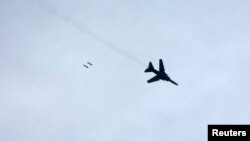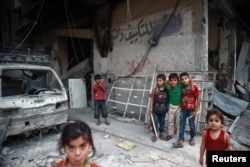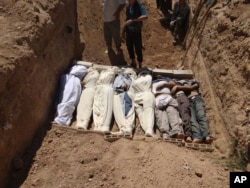Syrian government warplanes broke a cease-fire agreement Monday for the second consecutive day with airstrikes on districts in rebel-held Eastern Ghouta near the country’s capital, Damascus, say political activists.
According to the British-based monitoring group Syrian Observatory for Human Rights, a bombing raid Monday on the town of Arbin left eight civilians dead and at least 30 wounded. The Syrian military said it launched the bombing runs because of a breach of the cease-fire by Jaish al-Islam - an armed opposition group.
On Sunday, government warplanes launched half-a-dozen airstrikes on the towns of Douma and Ain Terma, breaking the so-called Cairo agreement sponsored by Egypt and Russia, which officially went into effect at noon Saturday.
The Arbin attack is “the first time in which civilian casualties have fallen due to shelling by the regime or bombardment by warplanes since the start of the truce agreement in the Eastern Ghouta,” the Syrian Observatory said. Political activists also recorded several breaches of the cease-fire by some rebel factions firing mortars.
The airstrikes Monday came despite Russia, an ally of Syrian President Bashar al-Assad, deploying military police in Eastern Ghouta, just east of Damascus, to monitor the de-escalation zone. The Russian Defense Ministry said in a statement that its military police had set up two checkpoints and a handful of observation posts in the area.
International negotiations
Russian military police were also deployed to other de-escalation zones in southwest Syria that were agreed to by the United States, Russia and Jordan earlier this month in a move widely seen as the unfolding of a behind-the-scenes deal to carve up Syria into temporary zones of influence.
There are four de-escalation zones in Syria. Russian leader Vladimir Putin and U.S. President Donald Trump discussed them when they met at the G-20 summit, where they agreed to a cease-fire accord. But earlier the two leaders had discussed establishing de-escalation zones on the phone, including a call in May.
Under the Cairo Agreement, there’s meant to be a full cease-fire in Eastern Ghouta; no Syrian government forces are meant to enter, but humanitarian aid should be allowed in. Several previous cease-fires in Eastern Ghouta have quickly crumbled, with all sides blaming their foes for the collapse. Syria’s Eastern Ghouta has an estimated population of nearly 400,000 people and is the biggest Damascus suburb still in rebel hands.
WMDs in urban warfare
The urban warfare there has been among the fiercest of the brutal six-year civil war. Eastern Ghouta was one of two targets of an August 2013 chemical attack and was struck by rockets packed with the chemical agent sarin. The other suburb hit was Western Ghouta. Death toll estimates of the attacks range from 300 people to more than 1,700.
A U.N. investigation team concluded there was “clear and convincing evidence” that sarin had been delivered by surface-to-surface rockets. The Syrian regime denied responsibility and blamed the rebels for what it described as a “false flag” operation.
Although the rebels have managed to hang on in Eastern Ghouta, there’s been constant infighting between insurgent militias. Rebel commanders say they have little optimism the truce will last, seeing it as a tactical pause for Damascus to maneuver its forces.
On Monday, Trump appeared to confirm on Twitter that he’s ended a semi-covert CIA program first started in 2013 that’s been off-and-on arming anti-Assad rebels.
Zones of influence
Syria appears now to be destined, at least in the near future, to be split into zones of influence with central and southern Syria to the west of the Euphrates River seen as falling within the territory of the government of President Assad, say analysts. The city of Raqqa and a chunk of the east, to the Iraqi border appears to be deemed to be in a zone of influence overseen by the U.S. and its ground allies as they battle the Islamic State terror group. The Trump administration has made it clear its priority in Syria is the defeat of IS and not the ouster of Assad.
In the southwest, where Russian military police have been deployed, a cease-fire negotiated by Washington and Moscow is largely holding. The Israeli government reportedly is uncomfortable with the idea of Russia policing zones near its border, fearing the action could be used as cover by Hezbollah and other Iranian-backed militias allied with Assad to move nearer to Israel.
Last week, senior U.S. officials briefed American lawmakers on the “prospects for cooperation” between Washington and Moscow. Some U.S. lawmakers fear cooperation serves the interests of the Assad regime and is undermining any chance of a political settlement of the war being reached.






